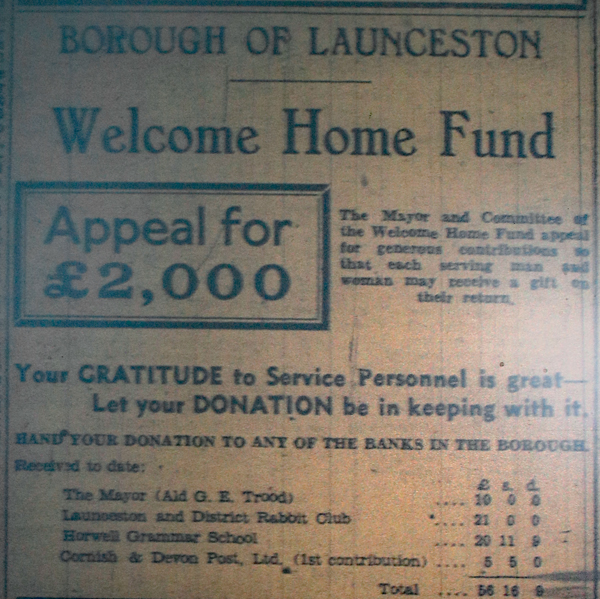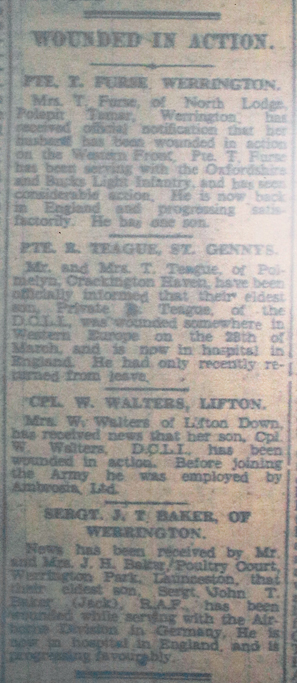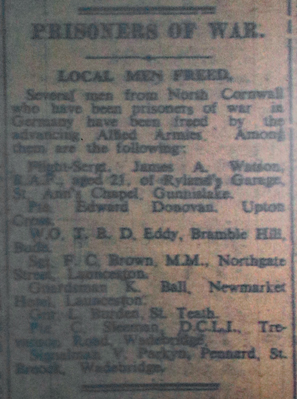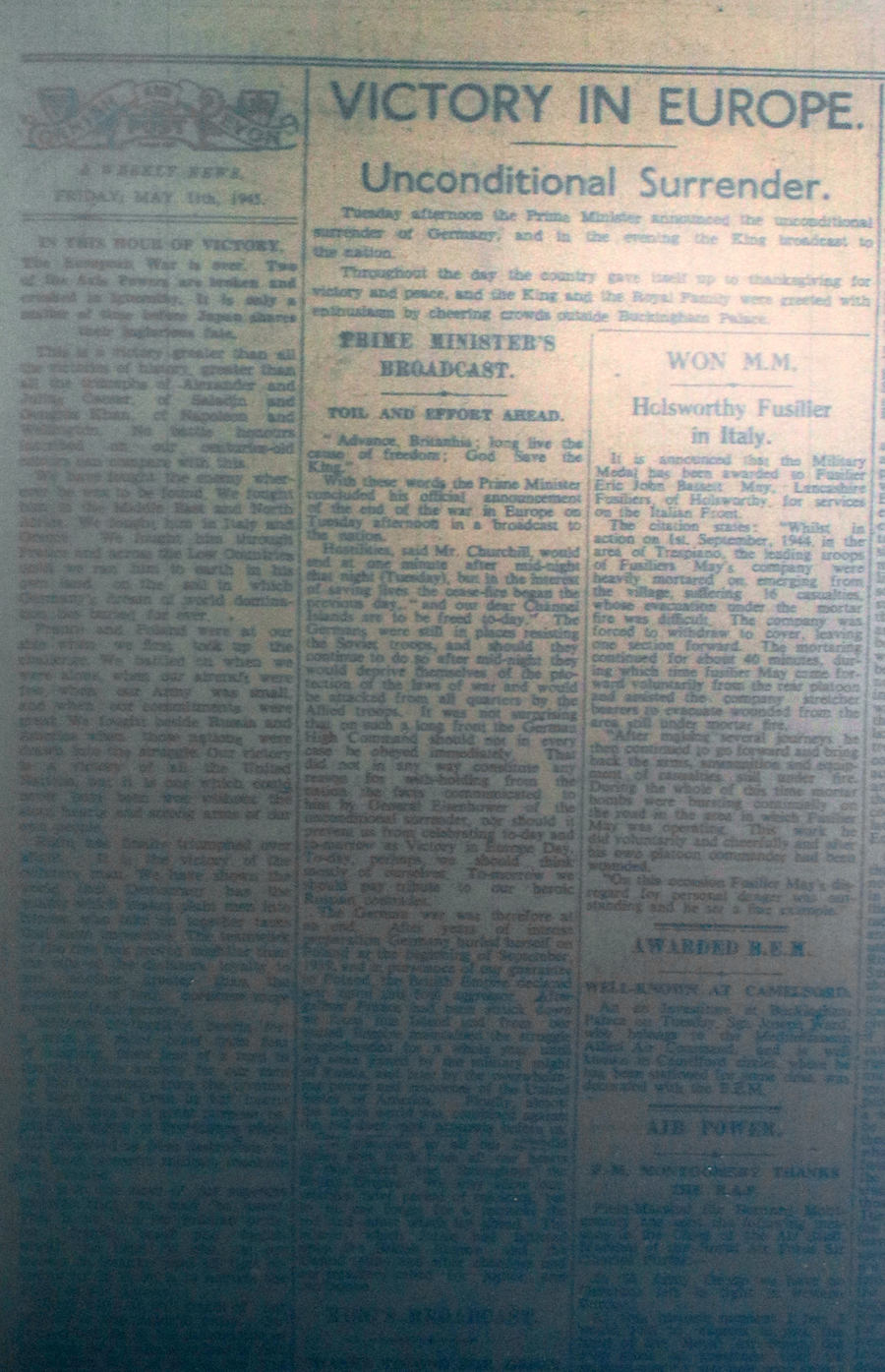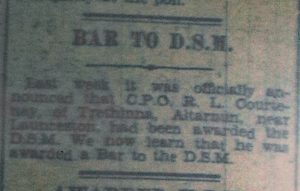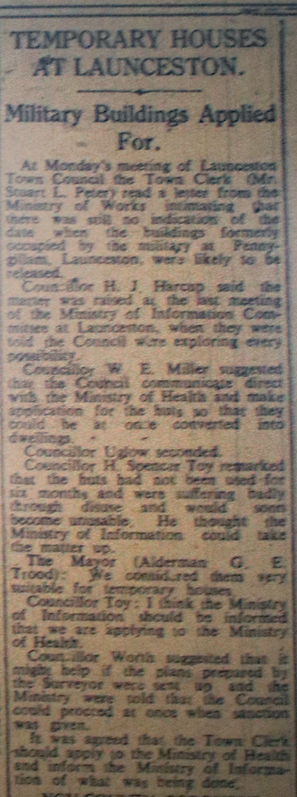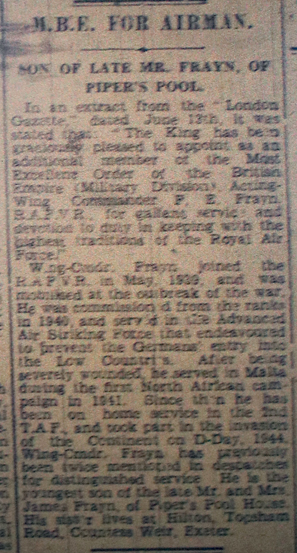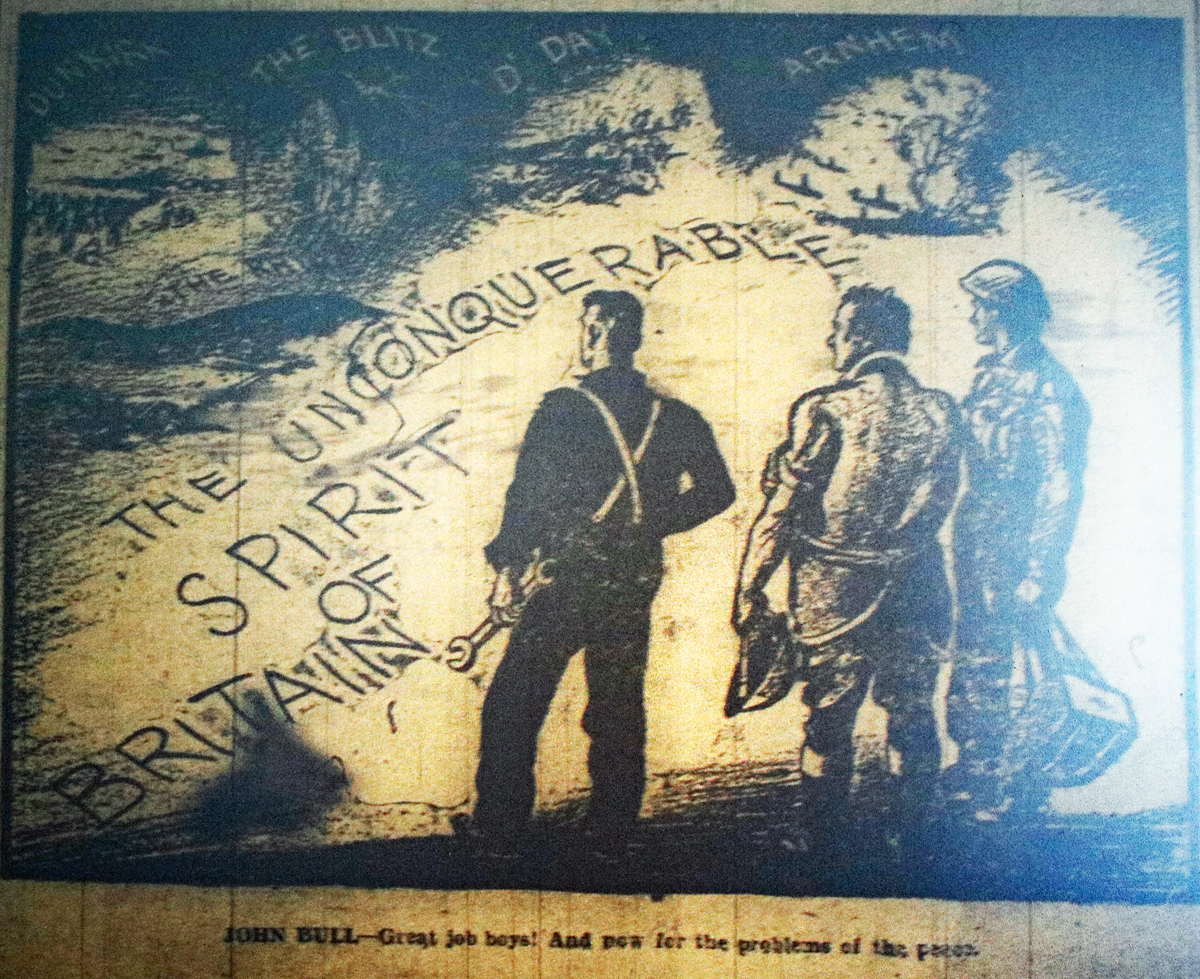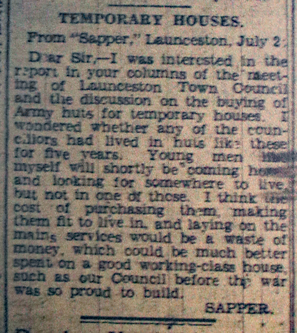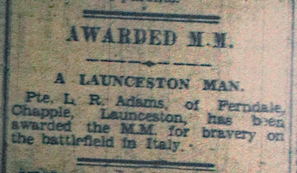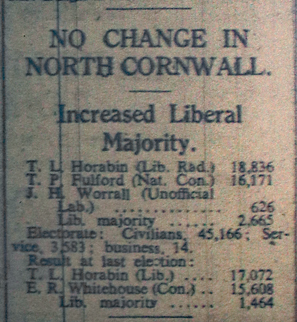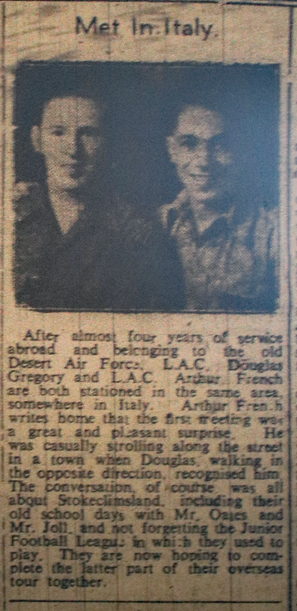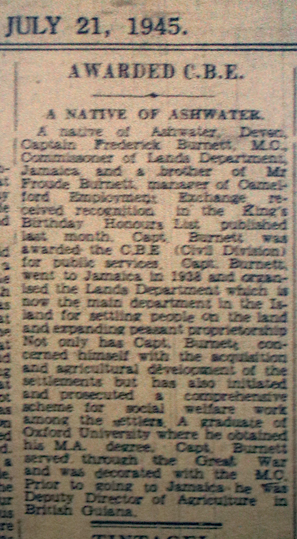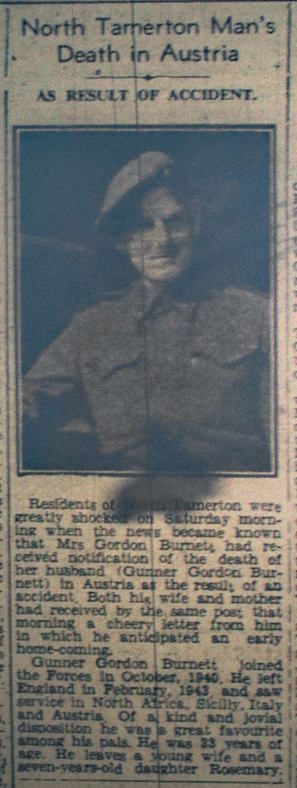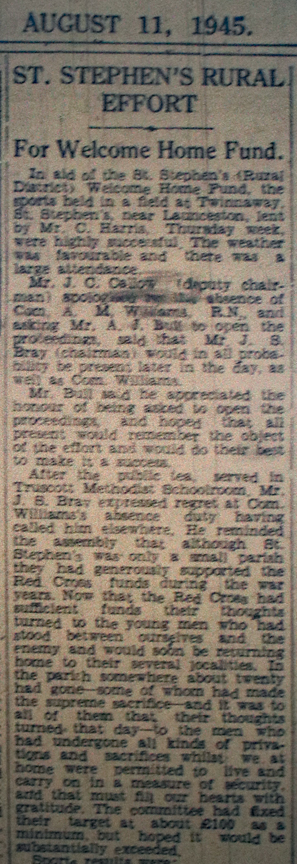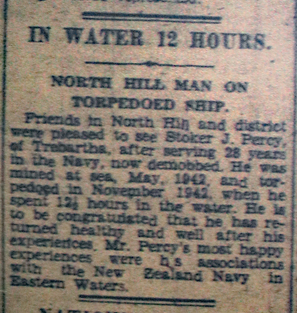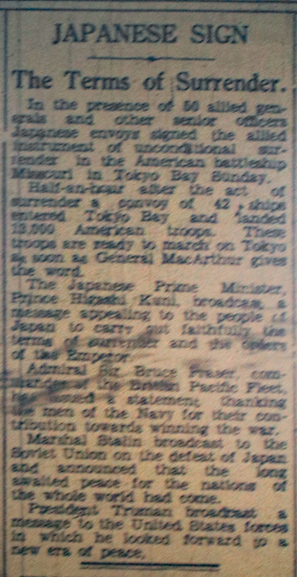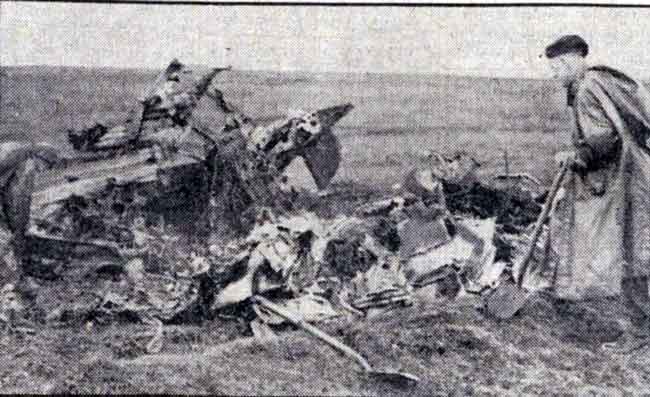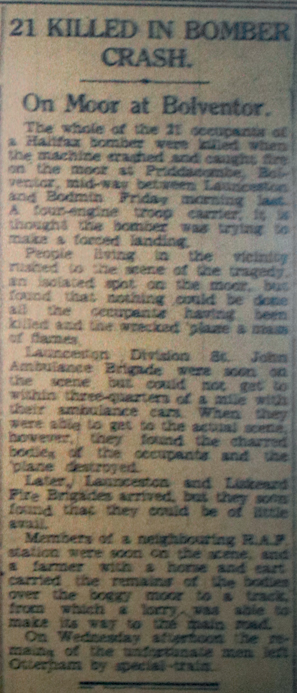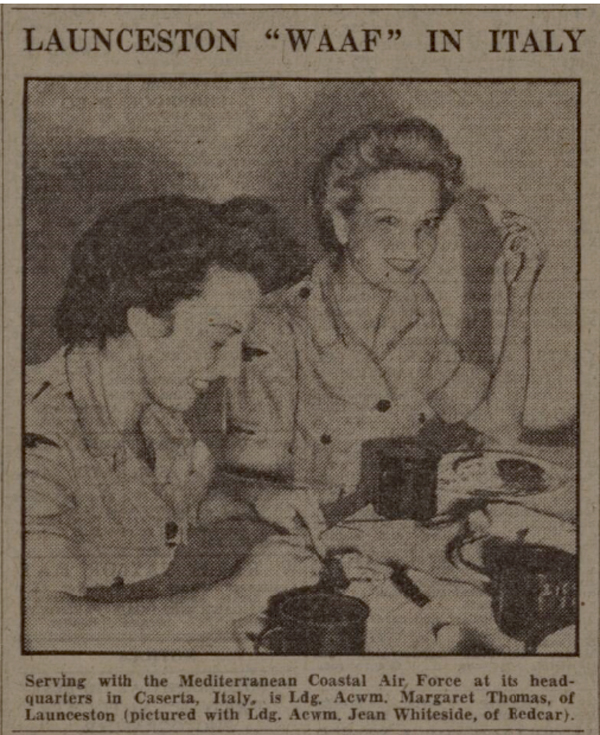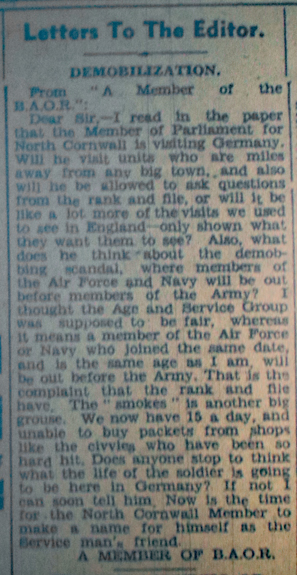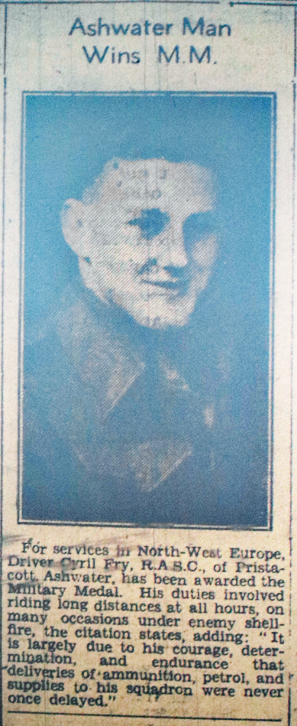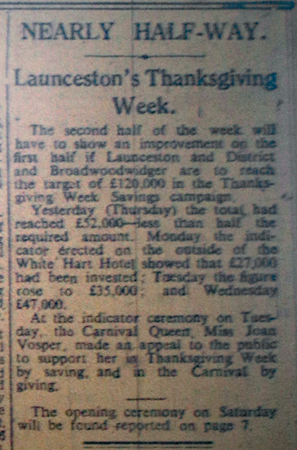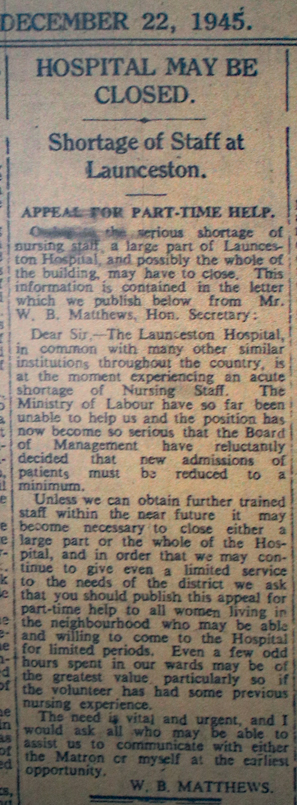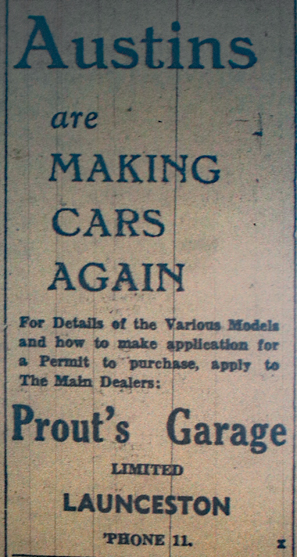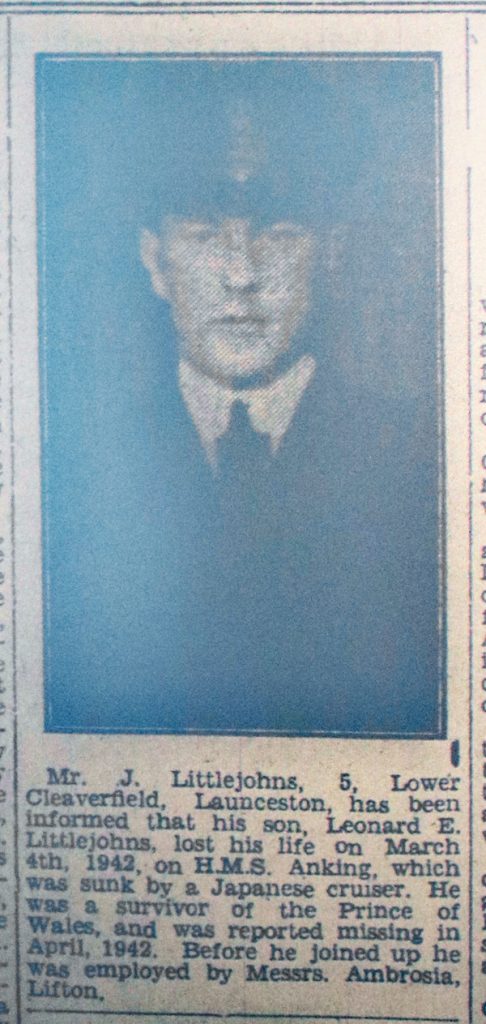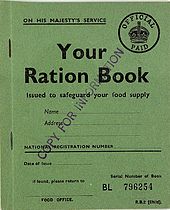.
1945, The Wars End.
On January 3rd, the Allies take the offensive east of the Bulge but they fail to close the pincers (which might have surrounded large numbers of Germans) with Patton’s tanks. The East Prussian Offensive, a major Red Army offensive in East Prussia, begins on January 13th. Three days later the U.S. First and Third Armies link up following the Battle of the Bulge. The following day the Battle is officially at an end plus on the eastern front, Warsaw is entered by Red Army troops. A government favourable to the Communists is installed. On the 18th, Hitler orders that any retreats of divisions or larger units must be approved by him. But the following day the Germans continue to retreat as the Red Army advances into East Prussia and by the 31st, the Red Army crosses the Oder River into Germany and are now less than 50 miles from Berlin. On the January 27th, Auschwitz concentration camp is entered by Soviet troops.
At the beginning of January the four mainline railway companies, in a joint statement on their post-war intentions, announced that as soon as the national situation permits they were ready to re-equip the railways, re-train their staffs, and carry out extensive improvements that would furnish Great Britain with the finest railway services in the world.
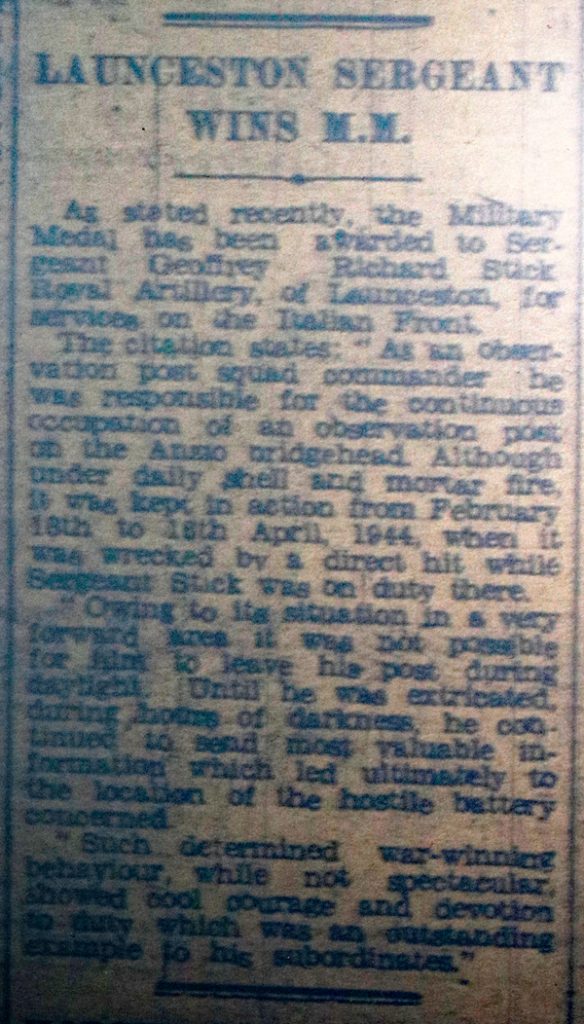

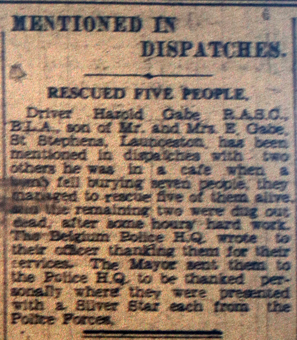


At the February meeting of Launceston Town Council, Clr. the Reverend H. J. Harcup asked what arrangements were being made in connection with the day when they would celebrate the cessation of hostilities in Europe. He said that the clergy and ministers of the town would place themselves at the services of the people as soon as the word was given that we were to celebrate. In the evening there would be an open-air service in the Square, to be followed by three united services, one in St. Mary’s Church, one in St. Stephen’s Church, and one in Wesley Church. At the same meeting the system of calling the local fire brigade was severely criticised when it was alleged that there had been avoidable, delay in the arrival of the brigade at two recent fires, and when a fire occurred the previous day, an official of the Council, having smashed the glass of the callbox, near the fire brigade station, he could get no reply to his telephone call. Ald. W. H. Gilbert said owing to telephone calls for fire services having to go to Liskeard or Bodmin there was some delay in the case of two recent fires. The brigade always turned out promptly when they received a call, but were unable to do so until they received orders from Liskeard. In a fire last week, although the local fire station was only 200 yards away, there was delay, and had not Mr Quick, a section leader, himself fetched the brigade, there would have been further delay. From the time Mr Quick reached the station only three minutes elapsed before the brigade was on the spot, proving that there was no lack of smartness on the part of the brigade. Local residents were becoming alarmed, and the local brigade was receiving unfair criticism, Mr Gilbert added. Eventually, it was agreed that the Town Clerk should get into touch with the authorities on the matter.
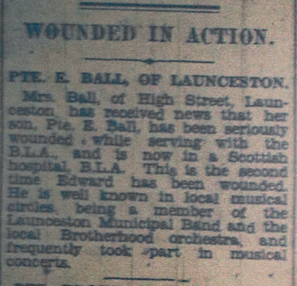
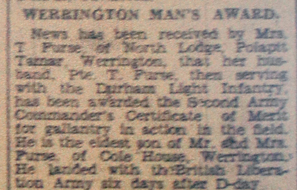

At the March meeting of the Launceston Town Council, Councillor W. E. Miller suggested that at the earliest date an effort should be made to prepare some sort of history of the voluntary war work done in the Borough by the various services. It would be a big task to collect the data, but he was sure those who would live in the Borough in the future would be greatly interested to see what part they had played in the town and what contribution they had made to the war effort. The Town Clerk agreed, saying that it would be a most interesting record. He suggested that the head of each service in the town should be asked to supply information. The war book used by the invasion Committee was being filed with the Borough documents. The Mayor (Ald. G. E Trood) announced they had inaugurated a Welcome Home Fund for local people the Services and were aiming at raising £2,000, whereby they should be able to present £5 to each of the 400 serving. By mid-September, the fund had reached £1,200. At a meeting of the committee in September, it was estimated that about 400 personnel would be returning. It was agreed at this meeting that the Fund would apply to men and women who were resident in Launceston on September 3rd, 1939, and who joined the Forces between September 3rd, 1939, and August 3rd, 1945.
At a meeting held on March 23rd, at Truro a conference of representatives of Borough, Urban and Rural District Councils in Cornwall, convened by the Cornwall branch of the Rural Councils Association, declared in favour of the post-war organisation of the Fire Service reverting to the control of local authorities under the 1938 Act. The Chairman, (Mr F. Dempster, St. Austell) stated that the Cornwall County Council did not desire control of the fire services, but preferred the restoration of the 1939 Act, subject to suitable safeguards which were already provided for by the Act.
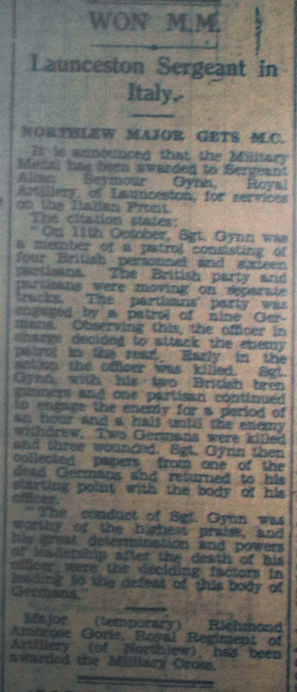
The death took place at Launceston on April 2nd, of Alderman H. Hoskin. Seven times Mayor of Launceston (five times in succession including the first four years of the war) thereby creating a record for the borough.
On April 9th, two Italian prisoners of war escaped from their camp near Launceston during the night-early morning. How they made their get-away was apparently unknown. However, on Wednesday morning April 11th, one of them was captured by police officers when walking along the road at Pipers Pool, in the direction of Bodmin. He offered no resistance when apprehended. He was later conveyed back to the camp. The second prisoner was recaptured on April 13th, at North Petherwin.
The Battle of Berlin ends when German General Helmuth Weidling, commander of the Berlin Defence Area, unconditionally surrenders the city of Berlin to Soviet General Vasily Chuikov. On the 4th, Karl Dönitz orders all U-boats to cease operations. German troops in Denmark, Northern Germany and The Netherlands surrender to Montgomery and Neuengamme concentration camp is liberated. Formal negotiations for Germany’s surrender begin at Reims, France the following day with Germany surrendering unconditionally on May 7th. The ceasefire takes effect at one minute past midnight and May 8th is officially proclaimed V.E. Day. Western Morning News – Tuesday, May 8th, 1945.
The Aftermath.
It was announced on May 19th, that the Launceston Branch of the British Legion had purchased Edymead House for the use of ex-service staff as a social centre. The house, standing in 3 1/2 acres, was originally built during the 19th century by a Mrs Bunbury and was later occupied by Colonel C. Byng and Mr F. Vowler. With the Vowler’s losing their two only sons during the First World War, on the death of Mr F. Vowler, the property passed into the hands of four nieces, who, when they heard the Legion were interested in it for the proposed scheme, most generously agreed to accept a figure very considerably below the fixed reserve price (£500 below market value). An appeal for funds was set up at a public meeting in the Town Hall. The club was officially formed at a meeting held on June 29th, where it was stated that at least £2,000 would be required by the end of the month to close the deal, and on top of that, there was a mortgage of £3,000 to also clear off. Mr Keast said that they were hopeful of raising a considerable amount by the sale of gardens and the grounds around. Lt.-Col. W. R. Prout pointed out that they had already raised £1,000, and he was confident that they would raise the final £1,000 in time to close the deal.
The Allies agree to divide Germany into four areas of control (American, British, French and Soviet) on June 5th, and on the 10th, Osaka, Japan, is heavily bombed. The United Kingdom begins demobilization on June 19th, and two days later it is announced that the defeat of the Japanese on Okinawa is now complete. The United Nations Charter is signed in San Francisco on June 26th.
The United States Navy stationed in Launceston, held a dance on June 14th, in aid of the ‘Welcome Home Fund,’ during which the Mayor was presented with the U.S. national flag. At the Town Council Meeting held on June 18th, Councillor Miller suggested that the American flag should be flown on American Independence Day as a mark of appreciation for all the American nation had done for this country.
At the end of June, Sergeant S. C. Adams, of 4, Chapple Park Terrace reported back to the Cornish and Devon Post, from a temporary camp on the seashore of the southern Peloponnese, where he was a senior N.C.O.. He stated that along with enjoying the sunny climate, his detachment made regular patrols to see how things were going in the remote mountain villages, where the occupying Germans had wreaked such havoc, and to help fetch supplies being arranged by voluntary welfare groups of the Red Cross working under UNRRA. Sergeant Adams had been an insurance inspector in Launceston before the war and joined the Royal Armoured Corps in August 1940, training to be a gunner and operator in a tank. “We had the two-pounder anti-tank gun then,” he said. “A quick and extremely accurate weapon; of course we had to get something heavier as enemy armour was increased in weight and toughness.” “After I had served some time in England, we went to Egypt before the push in the Western Desert and went right through that campaign from Alamein onwards, and then to Sicily and Italy, before getting a rest in Palestine and then coming to Greece.” His regiment was very highly reputed for its work in action; in Italy, it was in the front line for nearly 14 weeks just before it was pulled back; an exceptionally long time without a break possible a record for this kind of fighting. “Italy was much worse than the desert for tank work,” said Sergeant Adams. “In the desert, you could always get around obstacles; in Italy, with the mountains and ravines, you often had no option but to go straight through them. When I joined the army I met a man from Bideford. We became pals and stuck together right up to the time he was killed. He was a driver in my tank. There was a bombing raid on Lancio and the chaos didn’t tell me about my pal until afterwards. I was in a cinema at the time.” Sergeant Adams said that he had learned a little Greek since going to that country, and had local friends who speak English. Most of the people he had met there were very pro-British but there was quite a lot who didn’t seem to have realised that they must get busy if they want to rehabilitate their country, maybe they had not yet recovered from the period of enemy occupation.
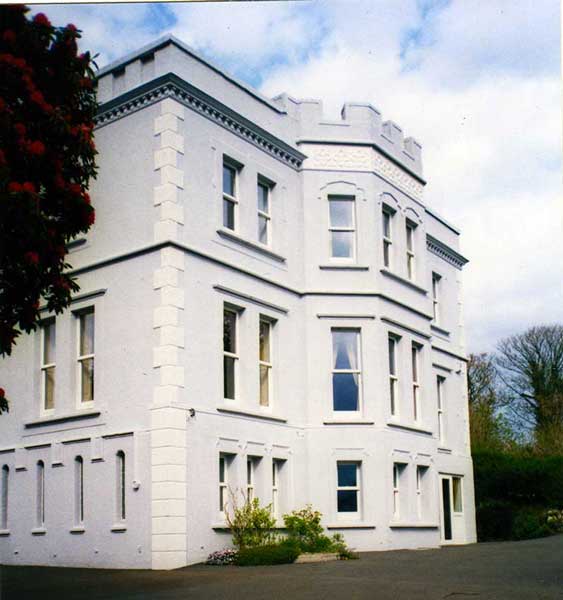
Craigmore (above) with its commanding view at the top of Windmill Hill, was used by the Royal Observer Corps for the duration of the war, only being stood down in the July of 1945. Post & Weekly News, July 14th, 1945: Royal Observer Corps. “Stand-Down” Dinner at Launceston.
That “K 2” was indeed a fortunate post in being placed on the roof of Craigmore through the generosity of Mr G and Mrs Peter, was again and again stated at the dinner in the White Hart Hotel, Launceston, on Saturday last, when Head Observer J. H. Lashbrook, who was the generous host, presided over a “stand-down” dinner. The Chairman was ably supported by Obs/Commander N F Bushby, MC.; Group Commandant Obs/Lt. P H Austin; Obs G Peter [toast master]; and L/Obs CFJ Bradford. The Services were represented by Sub/Lt. Raymond Lowey, RNVR.; Capt H J Wandless, Army Dental Corps; Major Branch, Home Guard; Sub Controller SL Peter, ARP; ex Obs J G Dingle, ROC; ex LAC Leslie Bradford, RAF; and Police Supt. W H Hallet.
After a really magnificent dinner, which was thoroughly enjoyed by all, the Toast Master gave the Loyal Toast, and the ‘Royal Observer Corps’ was given by Mr S L Peter and responded by Obs/Com, N H Bushby, MC., who said that the ROC throughout the country rendered a great service to the RAF, especially during the Battle of Britain, and later when the V-2 appeared.
The Launceston Post was one of the key posts, being in one of the most difficult aircraft lanes, and it was very seldom that one was missed. He asked the observers to consider seriously the question of volunteering for duty during the post-war period, as they would certainly be needed. He congratulated the post on their great luck in being placed on the roof of a house and having such splendid accommodation and hoped they would continue their association and friendships for many years. – – – -(more regarding the house and owners and their generosity with hot drinks and snacks, etc. – –)
A convivial evening followed when many reminiscences caused much enjoyment; and L/Obs. Bradford spoke of his attempts at mad-reading and plotting ‘planes and origins of sounds of explosions. After three cheers for Mr and Mrs Lashbrook for the use of their house since the post was dismantled, the National Anthem was sung, everyone wanted to be assured that there would be a similar meeting yearly for the future.
At the July meeting of the Town Council, it was agreed after a lengthy and heated discussion, that the wartime restrictions in regard to the limitation of hours for dances held in the Town Hall should be removed. The motion was carried by the casting vote of the Mayor (Ald. G. E. Trood), who said ‘it is time restrictions were taken off. It is absolutely ridiculous to try to tell people the time they should go to bed.‘
Egloskerry was also another village that was decorated with the Union Jack ‘floating triumphantly’ from the Church Tower, and another adorning the War Memorial. On the 22nd, there was a combined service of thanksgiving in the Church conducted by the Vicar. A children’s sports day was held in a filed lent by Mr Harris on Thursday, August 23rd, supervised by Messrs W. Davey and J. Grylls. After refreshments, everyone made for the Vicarage, where they played croquet and bowls. On the Sunday evening, another combined service was held in the Village Square. However, at Boyton, V.J. Day passed quietly, possibly due to the good weather for harvesting, but a thanksgiving service was held in Church conducted by Rev. S. L. Connor. Later the Church Bells were rung in celebration. At Polyphant on the Wednesday evening, a thanksgiving service was held in the Methodist Church conducted by Mr G. Venning. On the Thursday a victory tea was held on the Village Green organised by Mr and Mrs S. Martyn and Mr G. Venning and a band of helpers. Following the tea, sports were held for the children. A huge bonfire was built by Messrs W. Sedgman, C. Dawe, C. Wakem and G. Willcocks and at 9:30 p.m., Mrs A. Hockin, the eldest inhabitant of the village, lit it. Mr T. Baker of Trenarrett, supplied music with his gramophone, as the large crowd enjoyed refreshments.
St. Paternus Church bells were rung at South Petherwin on V.J. Day, followed by a thanksgiving service in the Church, conducted by Rev. G. Pitts. On the Thursday afternoon, there was a peace celebration where the youth marched through the village carrying flags to a sports field lent by Mr Martin. The procession was headed by Miss June Sadd dressed as a sailor boy, with Miss Joyce Spear, of South Molton as a nurse. They were accompanied by a musical band under the conductorship of Gerald Finnemore. The village had been decorated with flags and bunting, and at night electric coloured lights illuminated parts of the village. The programme of sports had been organised by Mr R. Maddever and Miss M. Maddever, assisted by Messrs G. Symons, C. Lane, G. Edwards, J. Strike, L. Oke, and A. H. Cheeseworth. A tea was provided afterwards in the W.I. Hall.
At Altarnun on the Wednesday, peals were rung from the Church and on the Thursday a bonfire built by the boys and girls on the Village Green which was lit later in the evening when there was singing and dancing around as fireworks were let off. On the 22nd a garden fete was held at the Sanctuary.
On August 30th, Royal Navy force under Rear-Admiral Cecil Harcourt liberates Hong Kong and the following day General MacArthur takes over command of the Japanese government in Tokyo. On September 2nd, The Japanese Instrument of Surrender is signed on the deck of the USS Missouri in Tokyo Bay.
At the beginning of August, a large number of German prisoners war brought to a camp just outside Launceston (Pennygillam) and by October there were 500 prisoners at the camp. Nearly £130 was realized at a garden party in aid of the Launceston British Legion Social Centre at Launceston on Thursday, August 9th. Presiding at the opening ceremony, Mr A. W. Johns, president of the local branch, said that they were aware that the Legion had bought Edymead as a social centre. Through the generosity of the Vowler family, the Legion were able to acquire the building on very generous terms, and they needed £2,500 to pay off the mortgage and to equip the building. Miss G. Vowler, Yelverton, spoke of her interest in the Legion and of her membership with the women’s section. Mr R. H. Keast, chairman of the local branch, said the building was intended to be a real welcome home for service men and women on their return. A boy—Leslie Gliddon—he said, had given 10s. his savings towards a chair for the chairman. A baby show was held, the judge being Miss G. Varcoe, Wadebridge, assisted by Nurses Owen and Linyten. Best baby in the show, Ann Chapman, and youngest in the show, David Randall.
At the end of September, the Home Office announced that the Government had decided that there would be many tasks for the W.V.S. to perform in the transitional period following the end of the war, possibly for two years, and that the organisation should, therefore, be continued in operation.
At the Town Council Meeting held on October 15th, a resolution was agreed to construct a new car park costing £2,000 at the Cattle Market. Councillor Miller, moving the resolution, said the site which would provide good parking for a large number of cars and would greatly improve the facilities at the Market. He remarked that the scheme would provide for one-way traffic through the centre of the main market and would provide reasonable accommodation for the washing of lorries, allowing them to leave without passing through the congested area. “They saw time after time people being summoned for leaving their cars on the highway and wondered if it were not the Council that should be summoned for not providing accommodation,” he said. The motion was for the Town Clerk to negotiate for the purchase of the north western portion of the filed No. 167 Ordnance Survey Map, and that a application be made to the Minister of Health for approval of the scheme. Alderman Fitze seconded. Councillor Fulford said he realised the value of the market to the town and that they had one of the best in the county, but he still maintained that the market was in the wrong position. He felt consideration should be given to a better and more adequate location before spending any further money on it. Alderman Harvey remarked that at the ratepayer’s meeting the previous week several big schemes were mentioned. The sewerage scheme needed tackling before a new market and would cost over £30,000. A parking ground must be obtained if it cost £2,000. It was close to the market and would be money well spent. Also at the meeting the Town Clerk read a letter from the Ministry of Health which intimated that they were not prepared to come to a decision on the Council’s application for a compulsory order for the acquisition of a building site, until Launceston and District Steam Laundry had had an opportunity of seeing the new lay-out plan. He had replied to that letter stating that the laundry company had seen the plan but had had no further reply. Councillor Fulford said that Councillor Miller and himself had been to the Ministry of Health in regard to the housing scheme and were very disappointed at the progress they made. He said that the scheme was being held up owing to the desire of the laundry to acquire a piece of land subsequent to the Council’s efforts to acquire the land. Councillor Miller and himself expressed concern at the repeated delays, considering that they had started on the matter in 1943. Councillor Miller said he was very disappointed with the whole affair. He felt there was no real help coming from the Ministry to enable the Council to push on with the work. He was of the opinion that towns like Launceston would have to take second place to the bombed areas and they would have to fight hard to make any progress. Alderman Fitze said the steam laundry purchased the piece of land after the Council’s notice of intention to acquire the land. Alderman Harvey said he was getting very disturbed about the housing question. It did not seem that they would be able to build houses for some, and he was going to ask the Council to consider prefabricated houses.
On November 3rd, Launceston began its ‘Thanksgiving Week’ campaign. The chief speaker was the Right Hon. Sir Claude James, Agent-General of Tasmania, and a native of Launceston, Tasmania. £120,000 was the target of the campaign. Preceding the opening ceremony there was a procession, led by the Royal Marine Band, of Devonport, and the following organisations took part: 30th Devonshire Regiment, Army Cadets, A.T.C., British Legion, St. John Ambulance Brigade and cadets, Ambulance nurses and cadets, Red Cross Detachment and cadets, Girl Guides and Boy Scouts. After the parade the band played selections in the Town Hall, and after the opening ceremony in the Square. On the Monday, a concert was held in the Town Hall, by the Royal Marine Police Choir, which drew a large crowd.
The start of the Nuremberg War Crimes tribunal begins on November 20th, US Supreme Court Justice Robert H. Jackson opens for the prosecution with a speech lasting several hours, leaving a deep impression on both the court and the public.
At their annual meeting held on November 20th, the Launceston Branch of the Farmers Union,expressed their disapproval of the regulation whereby those employing prisoner of war labour had to pay, when owing to wet weather, the men were unable to work. The question arose when Mr Wadge enquired who was responsible for the raising of the wage rate of P.O.W. labour from 1s. to 1s. 3d. per hours. Mr R Paynter replied that it was the Minister of Agriculture. He had been asked by the Agricultural Workers Union to make the figure 1s. 6d. per hour, as it was considered to be in competition with local labour. The Farmer’s Union stood out for no change, so the Minister split the difference. Mr Wadge said the labour was dear when it was considered that the men had to be fetched and taken back, and he proposed that the War Agricultural Committee be asked to provide transport. This was seconded by Mr E. Baker and was agreed. Mr C. P. Goodman enquired when the Italian prisoners would be returning, Mr Paynter replied that gathered they would be returning in the spring, but German labour would be available for the following year’s harvest.
At the November meeting of the Town Council, the question of the housing scheme at Hurdon came up again, with still no decision from the Ministry of Health, and it was decided to send a telegram direct to the Ministry, and to telephone North Cornwall M.P., Mr T. Horrabin, asking him to take up the matter.
Link to Bert Tremain’s oral memory of his time with the DCLI during the Second World War.
Rationing.
Timeline
May 25th, 1945: Bacon ration cut from 4 to 3 ounces/week. Cooking fat ration cut from 2 to 1 ounces/week. Soap ration cut by an eighth, except for babies and young children. The referenced newspaper article predicted that households would be grossly hampered in making food items that included pastry.
June 1st, 1945: The basic petrol ration for civilians was restored.
July 19th, 1945: In order to preserve the egalitarian nature of rationing, gift food parcels from overseas weighing more than 5 lb (2.3 kg) would be deducted from the recipient’s ration.
Summer 1946: Continual rain ruined Britain’s wheat crop. Bread rationing started.
January–March 1947: Winter of 1946–1947 in the United Kingdom: long hard frost and deep snow. Frost destroyed a huge amount of stored potatoes. Potato rationing started.
Mid-1947: A transport and dock strike, which among other effects caused much loss of imported meat left to rot on the docks, until the Army broke the strike. The basic petrol ration was stopped.
June 1st, 1948: The Motor Spirit (Regulation) Act 1948 was passed, ordering a red dye to be to put into some petrol, and that red petrol was only allowed to be used in commercial vehicles. A private car driver could lose his driving licence for a year if red petrol was found in his car. A petrol station could be shut down if it sold red petrol to a private car driver.
June 1948: The basic petrol ration was restored, at a third of its previous size.
1948: Bread came off ration.
May 1949: Clothes rationing ended. According to one author, this was because attempts to enforce it were defeated by continual massive illegality (black market, unofficial trade in loose clothing coupons (many forged), bulk thefts of unissued clothes ration books).
February 23rd, 1950: The 1950 general election is fought largely on the issue of rationing. The Conservative Party campaigned on a manifesto of ending rationing as quickly as possible. The Labour Party argued for the continuation of rationing indefinitely. Labour was returned, but with its majority badly slashed to 5 seats.
May 26th, 1950: Petrol rationing ended.
October 25th, 1951: United Kingdom general election, 1951. The Conservatives came back into power.
February 1953: Confectionery rationing ended.
September 1953: Sugar rationing ended.
July 4th, 1954: Meat and all other food rationing ended in Britain.
Visits: 99

